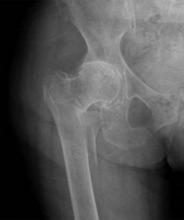Orthopedic surgeons do an excellent job repairing hip, wrist, and other low energy fractures. But sometimes the fracture is not the sole issue. Underlying bone health and osteoporosis should be addressed, as well to minimize the chances of future fractures. This can be a challenge in busy Orthopedic clinics.
At Iowa, the Bone Health Clinic is designed to fill this gap in bone health care for patients—before and after a fracture.
National statistics indicate as many as 54 million Americans have low bone mass or osteoporosis, and that number is increasing as the population ages. A prior fracture is associated with an 86% increased risk of a subsequent fracture. This means the population of patients that have sustained a fracture are at high risk of sustaining another fracture and they should be evaluated and treated. The importance of avoiding additional fractures is emphasized by the fact that 20-25% of women and 30% of men will die within 12 months of sustaining a hip fracture. The need for timely assessment and care plans to avoid subsequent fractures for this fragile patient population is clear.
“Patients were falling through the cracks,” says J. Lawrence Marsh, MD, professor and chair of the University of Iowa Department of Orthopedics and Rehabilitation. “Patients can be referred to their primary care provider or endocrinologist for bone health assessment and treatment, but that often does not happen. The best time to initiate a treatment program is at the time of treatment of the original fracture and this is best done by the department treating the fracture."
Recognizing the need for coordinated diagnostic and preventive bone health services for patients with fragility inspired fractures led Marsh to establish the Bone Health Clinic (BHC) in 2020.
This x-ray shows a hip fracture in an elderly patient with osteoporosis.
Based in the UI Department of Orthopedics and Rehabilitation, BHC services include:
Inpatient consultation at the time of a first fracture with recommendations for

optimal nutrition for fracture healing
- Follow-up consultation with coordination of DEXA scan and labs
- Calculation and explanation of FRAX score
- Develop a personal plan to mitigate risk for future fracture
- Nutrition, protein, and vitamin D supplement counseling
- Fall risk prevention recommendations
- Prescription medication for prevention or mitigation of future fracture risk
Lori Fitton, PhD, APRN-CNP, is the bone health provider, and Hannah Hayes, BSN, RN, ONC, serve as the clinical coordinator of the program. Ashley Manning is the BHC’s administrative coordinator.
BHC care plans closely follow guidelines established through the American Orthopaedic Association (AOA) Own the Bone initiative. Through its participation with Own the Bone, UI Health Care has earned a Star Performer designation, an achievement reserved for institutions that perform the highest level of fragility fracture and bone health care. The Own the Bone designation demonstrates a commitment to helping patients understand their risk for future fractures and the steps they can take to prevent them.
Any provider can refer at risk patients to the BHC. Patients—with or without a prior fracture—may also schedule an appointment. Since the opening of the BHC, orthopedic surgeons at Iowa have found that patients, when offered these measures, are eager to learn how they can improve their bone health.
“By promoting and coordinating preventive services to patients with fragility issues, we expect to see a decrease in repeated falls and fractures in the years ahead,” Fitton says.